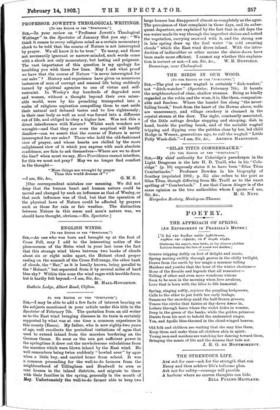PROFESSOR JOWETT'S THEOLOGICAL WRITINGS. - l're THE EDITOR 01% THE
"srsczazos.-] SDL,—In your review on "Professor jowett's Theological Writings"- in the Spectator of January 31st you say "We think it comes to every religious mind as a certain momentary shock to be told that the course of Nature is not interrupted by prayer. We all know_ it to be true." To many, and those not necessarily ignorant or narrow-minded, such words come with a shock not only momentary, but lasting and poignant. The vast importance of this question is my apology for troubling you with these few lines. May I ask what proof we have that the course of Nature "is never interrupted, for our sake " ? History and experience have given us numerous instances of men of corrupt and sensual life being suddenly turned by spiritual agencies to one of virtue and self- restraint. In Wesley's day hundreds of degraded men and women, without a thought beyond their own miser- able world, were by his preaching transported into a realm of religious aspiration compelling them to cast aside their natural and debased tastes and to live righteously; _ in their case body as well as soul was forced into a different rut of life, and obliged to obey a higher law. Was not this a direct interference with Nature? Whilst such wonders are wrought—and that they are even the sceptical will hardly disallow—can we assert that the course of Nature is never interrupted for our sake P Those who hold the old-fashioned view of prayer, and whose hearts are chilled by the more enlightened view of it which you express with such absolute confidence, are fain to ask themselves—Where are we to draw the line? when must we say, Here Providence cannot interfere, for this we must not pray? May we no longer find comfort in the thought—
"More things are wrought by prayer Than this world dreams of" ?
—I am, Sir, &c., G. M. S.
[Our correspondent mistakes our meaning. We did not deny that the human heart and human nature could be moved and changed by such an influence as that of Wesley, or that such influence was of God, but that the operation of the physical laws of Nature could be affected by prayers such as those for rain or fair weather. The distinction between Nature in this sense and man's nature was, we should have thought, obvious.—ED. Spectator.]






































 Previous page
Previous page